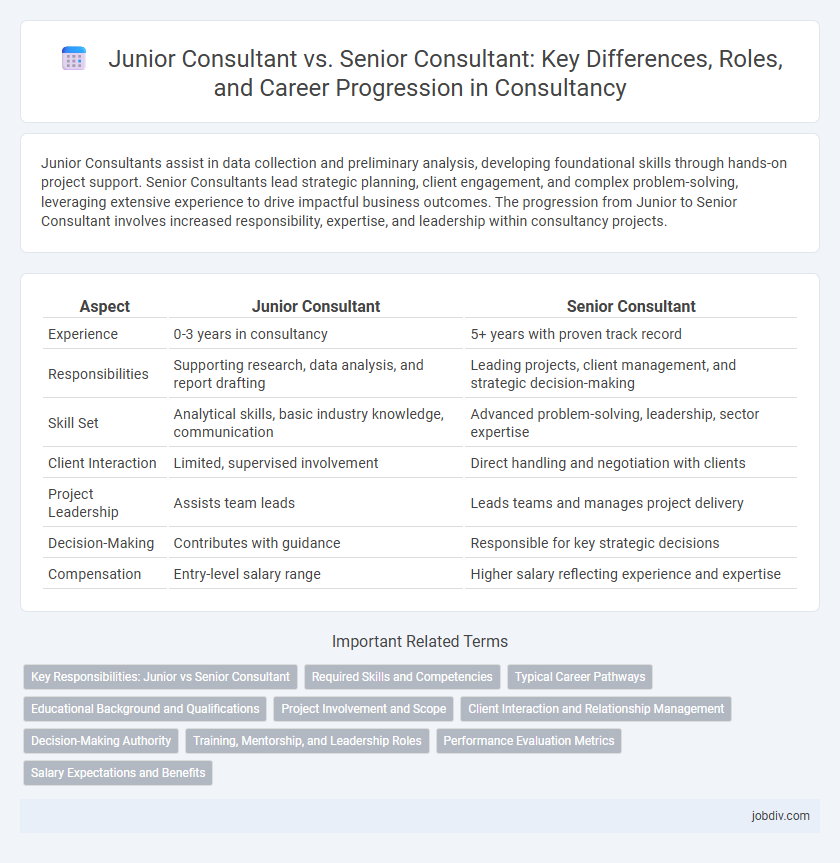Junior Consultants assist in data collection and preliminary analysis, developing foundational skills through hands-on project support. Senior Consultants lead strategic planning, client engagement, and complex problem-solving, leveraging extensive experience to drive impactful business outcomes. The progression from Junior to Senior Consultant involves increased responsibility, expertise, and leadership within consultancy projects.
Table of Comparison
| Aspect | Junior Consultant | Senior Consultant |
|---|---|---|
| Experience | 0-3 years in consultancy | 5+ years with proven track record |
| Responsibilities | Supporting research, data analysis, and report drafting | Leading projects, client management, and strategic decision-making |
| Skill Set | Analytical skills, basic industry knowledge, communication | Advanced problem-solving, leadership, sector expertise |
| Client Interaction | Limited, supervised involvement | Direct handling and negotiation with clients |
| Project Leadership | Assists team leads | Leads teams and manages project delivery |
| Decision-Making | Contributes with guidance | Responsible for key strategic decisions |
| Compensation | Entry-level salary range | Higher salary reflecting experience and expertise |
Key Responsibilities: Junior vs Senior Consultant
Junior Consultants handle data collection, conduct initial analysis, and support senior team members in project delivery by preparing presentations and reports. Senior Consultants take on strategic responsibilities such as leading client engagements, developing comprehensive solutions, and managing project timelines while mentoring junior staff. The distinction lies in the scope of decision-making authority, client interaction, and leadership roles within consulting projects.
Required Skills and Competencies
Junior Consultants require strong analytical abilities, basic project management skills, and proficiency in data collection and interpretation to support client engagements effectively. Senior Consultants demonstrate advanced problem-solving expertise, leadership in managing teams and complex projects, and deep industry knowledge with refined communication skills for stakeholder management. Both roles demand adaptability and continuous learning, but Senior Consultants excel through strategic thinking and mentoring capabilities.
Typical Career Pathways
Junior Consultants typically begin with foundational tasks such as data analysis, research, and supporting client presentations, gaining industry knowledge and consulting methodologies. As they develop expertise and demonstrate problem-solving skills, they progress to Senior Consultant roles, leading project modules, managing client relationships, and delivering strategic recommendations. Career pathways often involve continuous skills development, specialization in sectors, and expanding leadership responsibilities, ultimately positioning Senior Consultants for managerial or partner-level opportunities within consultancy firms.
Educational Background and Qualifications
Junior Consultants typically hold a bachelor's degree in business, finance, or related fields, often supplemented by internships or entry-level certifications such as CAPM or Lean Six Sigma Yellow Belt. Senior Consultants possess advanced qualifications, including master's degrees (MBA or specialized fields), professional certifications like PMP or CFA, and extensive project experience demonstrating leadership and strategic expertise. Education for Senior Consultants emphasizes continuous professional development and specialized knowledge, crucial for handling complex consultancy projects and client engagements.
Project Involvement and Scope
Junior Consultants typically support project teams by handling specific tasks, data analysis, and client communication within a limited scope. Senior Consultants lead project segments, manage client relationships, and oversee complex problem-solving across multiple workstreams. Their involvement spans strategic planning, decision-making, and ensuring project goals align with broader business objectives.
Client Interaction and Relationship Management
Junior Consultants typically focus on supporting Senior Consultants by gathering data, preparing reports, and assisting in client meetings, allowing them to build foundational client interaction skills. Senior Consultants lead client interactions, driving strategic discussions and managing complex relationship dynamics to ensure client satisfaction and long-term engagement. They leverage extensive experience to anticipate client needs, resolve conflicts, and foster trust, which is critical for successful consultancy outcomes.
Decision-Making Authority
Junior Consultants typically have limited decision-making authority, often relying on senior team members for guidance and final approval. Senior Consultants possess greater autonomy to make strategic and operational decisions, reflecting their experience and expertise in managing complex client projects. Enhanced decision-making authority in Senior Consultants directly impacts project outcomes and client satisfaction.
Training, Mentorship, and Leadership Roles
Junior Consultants primarily focus on developing core consulting skills through structured training programs and hands-on project experience, benefiting from mentorship provided by Senior Consultants. Senior Consultants take on leadership roles by guiding junior team members, providing strategic mentorship, and managing client relationships to ensure project success. Training for Senior Consultants often includes advanced leadership development and specialized industry knowledge to enhance their ability to lead complex consulting engagements.
Performance Evaluation Metrics
Junior Consultant performance evaluation metrics primarily emphasize learning agility, task completion accuracy, and collaboration effectiveness, reflecting their developmental stage within consultancy projects. Senior Consultants are evaluated using advanced criteria such as strategic impact, client relationship management, and leadership in project delivery, demonstrating their role in driving business outcomes. Both levels use key performance indicators (KPIs) like billable hours, client feedback scores, and quality of deliverables to measure overall effectiveness in consultancy roles.
Salary Expectations and Benefits
Junior Consultants typically earn between $50,000 and $75,000 annually, while Senior Consultants can command salaries from $90,000 to $130,000 depending on industry and location. Senior Consultants often receive enhanced benefits such as performance bonuses, stock options, and comprehensive healthcare plans, reflecting their advanced responsibilities and expertise. Salary growth aligns with experience, specialized skills, and successful client project management in consultancy firms.
Junior Consultant vs Senior Consultant Infographic

 jobdiv.com
jobdiv.com